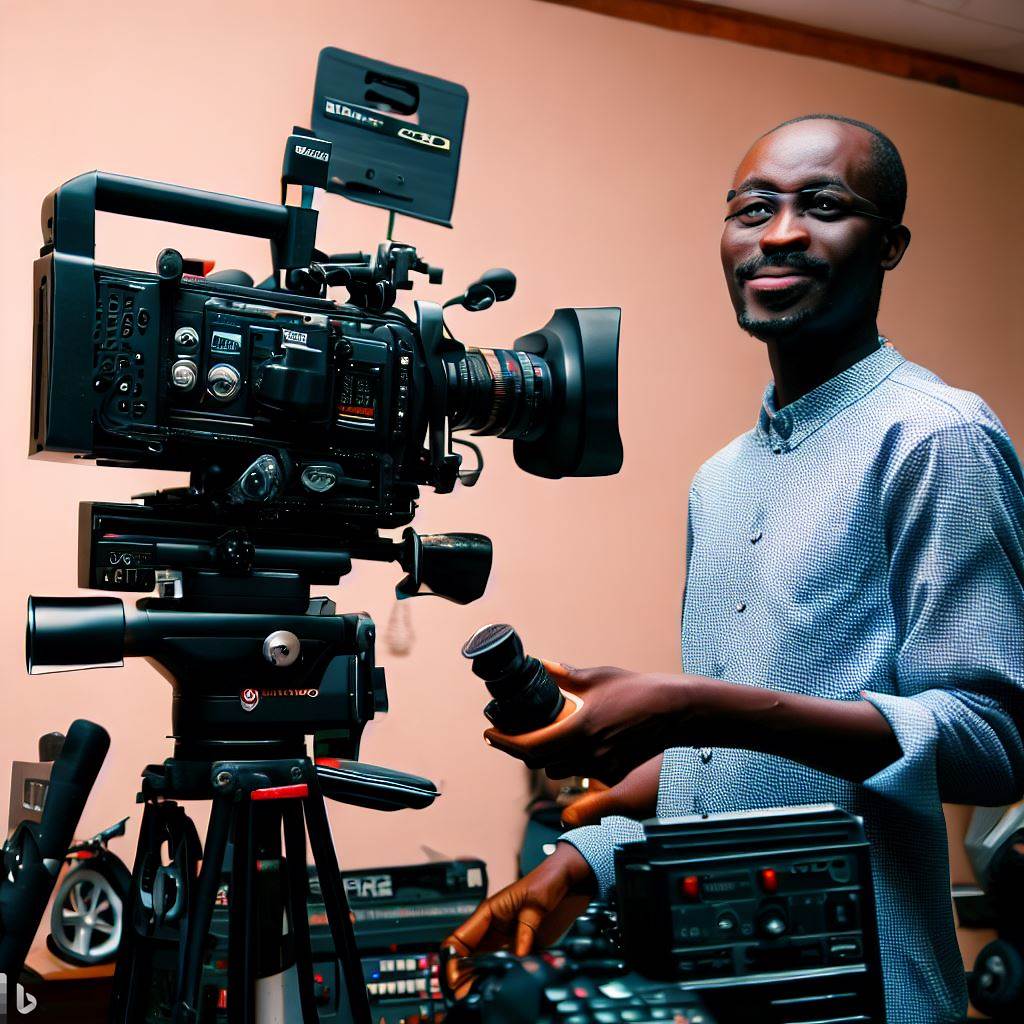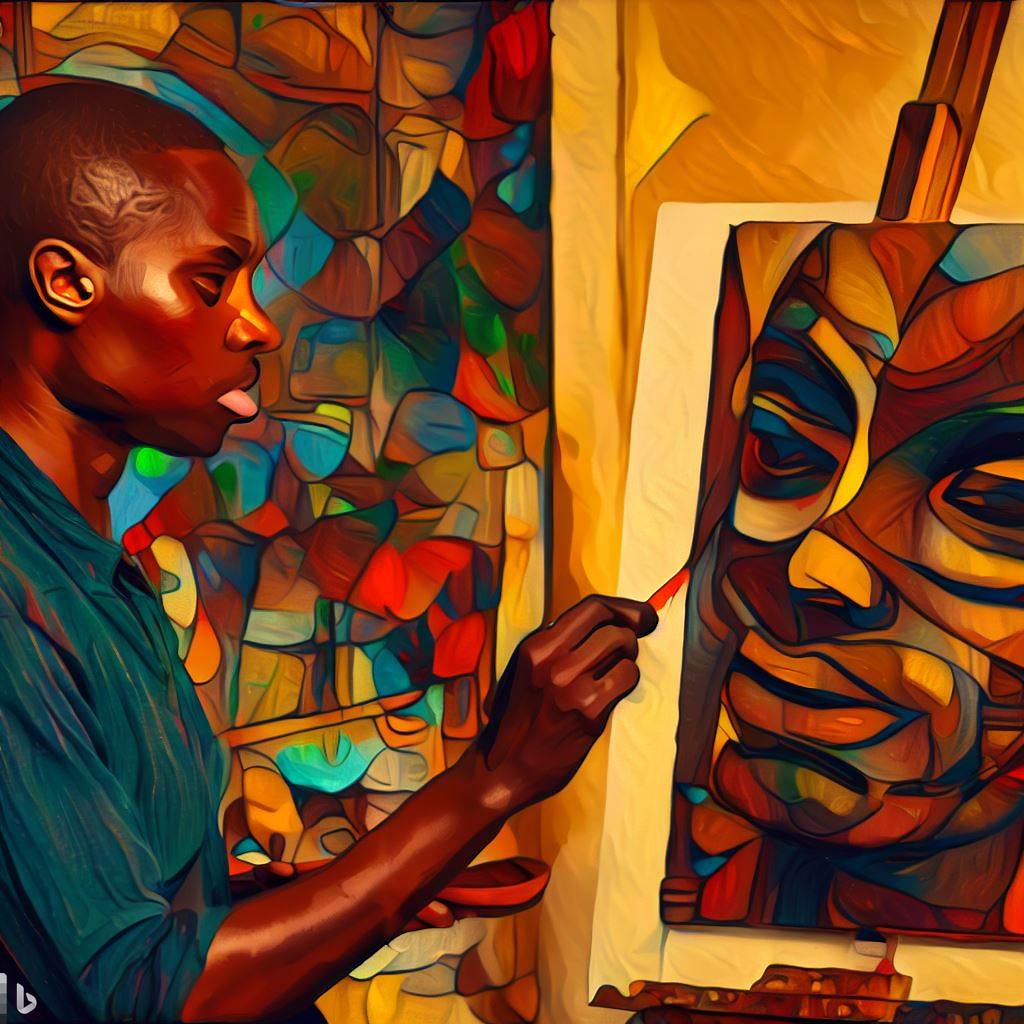Introduction
In the world of film-making, cinematography plays a crucial role in capturing visually stunning scenes that enhance storytelling.
Cinematography is the art of recording moving images and encompasses the use of various equipment and techniques to achieve desired visual effects.
Importance of cinematography equipment in film-making
The importance of cinematography equipment in film-making cannot be overstated.
These tools are essential for capturing high-quality images that bring the director’s vision to life.
From cameras and lenses to lighting and grip equipment, each piece contributes to the overall aesthetic and narrative of a film.
Cameras are the primary tools of a cinematographer, and the choice of camera can greatly impact the final result.
High-end digital cameras offer exceptional image quality and versatility, allowing filmmakers to experiment with different shooting styles.
Lenses, on the other hand, allow cinematographers to control depth of field, create specific visual effects, and add character to the images.
Lighting equipment is another critical aspect of cinematography. Proper lighting techniques can enhance mood, emphasise specific details, or create dramatic effects.
From key lights to fill lights, each lighting instrument serves a specific purpose in creating compelling visuals.
Grip equipment, such as tripods, dollies, and jibs, provide stability and mobility to cinematographers, enabling smooth camera movements and dynamic shots.
These tools are essential for capturing action sequences or adding visual flair to static scenes.
In Nigeria, the cinematography industry has experienced significant growth, with filmmakers embracing advanced equipment and techniques.
The availability of high-quality cameras, lenses, and lighting equipment has empowered Nigerian cinematographers to showcase their creativity on an international scale.
Cinematography equipment plays a pivotal role in the art of film-making.
Nigerian filmmakers are recognising its importance and investing in the latest technology to produce visually captivating films that resonate with audiences worldwide.
Overview of the Nigerian film industry
Nollywood, the Nigerian film industry, has experienced tremendous growth over the years and has become a significant presence in the global cinema landscape.
With a rich history dating back to the 1960s, Nollywood has evolved into the second-largest film industry in the world, producing thousands of movies annually.
The industry is known for its low-budget productions, often utilising locally available resources, which has helped it flourish despite limited funding and infrastructure.
Nollywood has also played a pivotal role in shaping Nigerian culture and identity, as it reflects the diverse realities and social issues faced by the people.
Growth and impact of Nollywood on the global cinema landscape
Nollywood’s influence on the global cinema landscape cannot be overstated. It has not only captivated domestic audiences but has also found a loyal following in various parts of the world.
The industry’s unique storytelling style, vibrant visuals, and relatable themes have resonated with audiences in Africa and beyond.
Furthermore, Nollywood has provided opportunities for actors, filmmakers, and other professionals in Nigeria, nurturing a growing talent pool.
The success of Nollywood has spurred interest from international filmmakers and investors seeking collaborations and partnerships.
Moreover, Nollywood has significantly contributed to Nigeria’s economy, generating revenue, creating jobs, and attracting tourists interested in the film industry.
Notable Nollywood movies:
- “Lionheart”
- “The Wedding Party”
- “October 1”
- “Half of a Yellow Sun”
- “Tango with Me”
Nollywood actors making waves globally:
- Genevieve Nnaji
- Omotola Jalade Ekeinde
- Ramsey Nouah
- John Okafor
- Rita Dominic
Nollywood film festivals and awards:
- Africa Movie Academy Awards (AMAA)
- Africa International Film Festival (AFRIFF)
- NollywoodWeek Paris Film Festival
- Nollywood Travel Film Festival (NTFF)
- Best of Nollywood Awards (BON)
The Nollywood continues to evolve, adapting to new technologies, improving production values, and exploring diverse storytelling techniques.
As the industry expands, it faces challenges such as copyright infringement, piracy, and the need for better distribution channels.
Nevertheless, Nollywood remains a force to be reckoned with and a testament to the power of film-making to inspire, entertain, and create cultural connections.
Types of cinematography equipment
- Camera equipment
- DSLR cameras
- Cinema cameras
- Virtual reality cameras
- Lighting equipment
- Continuous lighting
- Strobe lights
- LED panels
- Sound equipment
- Microphones
- Boom poles
- Audio recorders
- Tripods and stabilisers
- Importance of steady shots
- Tripods, mono-pods, and gimbals
When it comes to cinematography equipment in Nigeria, there are several types that are commonly used.
Each of these equipment plays a crucial role in capturing high-quality shots and creating visually stunning films.
In this section, we will explore the different types of cinematography equipment and their significance in the film-making process.
Camera Equipment
- DSLR cameras: These cameras offer versatility and affordability, making them ideal for independent filmmakers on a budget.
- Cinema cameras: Designed specifically for film-making, these cameras provide superior image quality and various professional features.
- Virtual reality cameras: Used to capture immersive 360-degree footage for virtual reality experiences.
Lighting Equipment
- Continuous lighting: These lights stay on throughout the shoot, providing a constant source of illumination.
- Strobe lights: Flash at regular intervals, creating a burst of light often used for dramatic effect.
- LED panels: Energy-efficient and adjustable lights that can be easily mounted and controlled.
Sound Equipment
- Microphones: Used to capture high-quality audio, there are various types such as shotgun, lavalier, and condenser microphones.
- Boom poles: Long poles with attached microphones that are held above actors to capture their dialogue.
- Audio recorders: Devices used to capture and store audio separately for better sound quality control during post-production.
Tripods and Stabilisers
- Importance of steady shots: Stabilisation is essential to avoid shaky footage and maintain a professional look.
- Tripods: Three-legged stands used to mount cameras for stable shots.
- Monopods: Single-legged supports that offer mobility while still providing some stability.
- Gimbals: Camera stabilisers that use motorised systems to counteract vibrations and movements.
As you can see, each type of cinematography equipment plays a crucial role in achieving high-quality footage and sound.
Having the right camera for stunning visuals, proper lighting, clear audio recording, and stabilising shots ensures a professional look.
When working on a film project in Nigeria or anywhere else, it is crucial to have access to the right cinematography equipment that suits your needs and budget.
By utilising the appropriate equipment, filmmakers can create visually captivating stories that engage and resonate with audiences.
Read: How to Start a Music Publishing Career in Nigeria
Availability of cinematography equipment in Nigeria
Local suppliers
- Lagos Equipment Market: Located in Lagos, this market offers a wide range of cinematography equipment.
- Abuja Camera Village: This marketplace in Abuja provides various camera equipment options for filmmakers.
- Filmhouse Cinemas: Aside from being a cinema chain, Filmhouse also offers equipment rentals for filmmakers.
International suppliers
- B&H Photo Video: This renowned online store ships cinematography equipment to Nigeria, ensuring access to global brands.
- Adorama: Another popular international supplier that delivers a wide range of cinematography equipment to Nigeria.
- Amazon: With global delivery services, Amazon allows Nigerian filmmakers to access a vast array of cinematography equipment.
Online marketplaces
- Jiji.ng: This popular online marketplace in Nigeria offers a wide range of new and used cinematography equipment.
- Konga: Known for its diverse range of products, Konga also provides cinematography equipment options.
- OLX Nigeria: This online classifieds platform connects buyers and sellers, including those in the cinematography industry.
Having a combination of local suppliers, international suppliers, and online marketplaces ensures that filmmakers in Nigeria have easy access to a variety of cinematography equipment.
Local suppliers like the Lagos Equipment Market and Abuja Camera Village provide convenience for those who prefer to physically browse and purchase equipment.
Filmhouse Cinemas offers rental services, allowing filmmakers to access equipment without the need for a significant financial commitment.
For a broader range of options, international suppliers play a crucial role. B&H Photo Video, Adorama, and Amazon are reputable online stores that ship cinematography equipment to Nigeria.
Filmmakers can explore a wide selection of global brands and the latest technology through these platforms.
Online marketplaces like Jiji.ng, Konga, and OLX Nigeria also contribute to the availability of cinematography equipment in Nigeria.
These platforms provide a space for both new and used equipment, catering to different budget levels. Filmmakers can easily search for specific equipment and connect with sellers across the country.
Despite the availability of these various sources, it is essential for filmmakers to carefully research and consider their options.
They should verify the authenticity and quality of the equipment offered, particularly when purchasing from online marketplaces.
Additionally, comparing prices and reviews can help filmmakers make informed decisions, ensuring they obtain reliable and suitable equipment for their projects.
Nigeria offers a range of options for acquiring cinematography equipment. Local suppliers like the Lagos Equipment Market and Abuja Camera Village provide convenient access.
International suppliers like B&H Photo Video and Adorama deliver globally recognised brands.
Online marketplaces including Jiji.ng, Konga, and OLX Nigeria offer diverse options for various budgets.
Filmmakers in Nigeria can take advantage of these resources to find the necessary equipment for their cinematography projects.
Read: Career Path: From Novice to Pro Sound Editor in Nigeria

Considerations when choosing cinematography equipment in Nigeria
When it comes to choosing cinematography equipment in Nigeria, there are several important considerations to keep in mind.
These considerations include budget constraints, quality and reliability, technical specifications, and service and support.
Budget constraints
Budget constraints are a vital factor to consider when selecting cinematography equipment in Nigeria.
Filmmakers must carefully assess their financial resources and determine how much they are willing to invest in their equipment.
It is essential to strike a balance between affordability and quality to ensure that the equipment purchased meets the required standards.
Quality and reliability
The quality and reliability of cinematography equipment are also crucial considerations.
Nigerian filmmakers need equipment that produces high-quality images and withstands the rigors of frequent use.
It is advisable to research and invest in reputable brands known for their reliability and durability to minimise the risk of equipment failures during a shoot.
Technical specifications
Technical specifications play a significant role in the selection process.
Filmmakers must understand the specific requirements of their projects and choose equipment that meets those requirements.
Factors such as resolution, frame rate, dynamic range, and lens compatibility should be carefully evaluated to ensure the chosen equipment can deliver the desired results.
Service and support
Another vital consideration is the availability of service and support for the chosen equipment.
Filmmakers need to ensure that technical support and maintenance services are readily accessible in Nigeria.
This is particularly crucial in case of any equipment malfunctions or the need for repairs.
Choosing equipment from manufacturers or suppliers with a strong support network can save time and money in the long run.
As part of the equipment selection process, it is helpful to create a list of requirements and prioritise them based on importance.
This helps in directing the focus towards the most critical features and characteristics needed for a project.
Additionally, seeking advice from industry professionals or cinematography equipment rental companies can provide valuable insights and recommendations.
When it comes to cinematography equipment, there are several specific items that are frequently used in Nigeria.
These include cameras, lenses, lighting equipment, stabilisers, and audio recording devices.
Each of these items has its own unique specifications and considerations, making it essential to thoroughly research and compare different options before making a final decision.
Cameras are at the forefront of cinematography equipment, and there are various types available, ranging from DSLRs to professional cinema cameras.
Filmmakers must consider factors such as sensor size, resolution, and codec support when choosing a camera that suits their specific needs and budget.
Lenses are also crucial components in cinematography, and the selection should be based on the desired visual style and project requirements.
Considerations such as focal length, aperture, and lens compatibility with the chosen camera should be taken into account.
Lighting equipment is vital to achieve proper illumination and create the desired mood or ambience in a scene.
Different types of lights, such as LED panels, fresnels, and softboxes, offer various advantages and disadvantages in terms of output, power consumption, and portability.
Read: Exploring Income Potential: The Pay for Translator in Nigeria
Renting vs. purchasing cinematography equipment
Advantages of renting
- Cost-effective: Renting equipment is more affordable compared to buying it upfront.
- Flexibility: Renting allows filmmakers to access a wide range of equipment options based on their specific needs for each project.
- No maintenance or storage fees: Renting eliminates the need for costly equipment maintenance and storage, as rental companies handle these aspects.
- Stay up to date: Renting ensures access to the latest equipment with updated features and technology.
- Try before you buy: Renting equipment allows filmmakers to test different brands and models before making a long-term investment.
Advantages of purchasing
- Long-term savings: Buying equipment can be more cost-effective in the long run, especially for filmmakers who frequently use specific equipment.
- Freedom and convenience: Owning equipment means having immediate access to it whenever needed, without going through rental processes.
- Customization: Purchasing allows filmmakers to personalise and modify their equipment according to their specific preferences and shooting style.
- Rental income potential: Filmmakers who own equipment can rent it out to other professionals, generating additional income.
- Investment value: Purchased equipment retains value over time and can be resold if needed, providing a return on investment.
Factors to consider when deciding
- Budget: Assess your financial resources and determine what is more economically viable for your current situation.
- Frequency of use: Consider how often you will use the equipment and whether renting or buying would be more cost-effective.
- Specific needs: Evaluate the type of projects you typically work on and the equipment required for those projects.
- Technology advancements: Determine how important it is for your work to have access to the latest and most advanced equipment.
- Storage and maintenance: Consider the costs and logistics of storing and maintaining equipment if you decide to purchase.
Both renting and purchasing cinematography equipment have their own advantages and considerations.
Renting is beneficial for its cost-effectiveness, flexibility, and access to the latest equipment.
On the other hand, buying equipment offers long-term savings, customisation, and potential rental income.
Filmmakers should consider their budget, frequency of use, specific needs, technology advancements, and storage/maintenance factors to make an informed decision.
Ultimately, the choice should be based on individual circumstances and the demands of each filmmaking project.
Read: Work Opportunities for Translators and Interpreters in Nigeria
Challenges of Cinematography Equipment Acquisition in Nigeria
Cinematography equipment acquisition in Nigeria presents numerous challenges that hinder the growth and development of the industry.
These challenges include cost implications, limited availability, and the prevalence of counterfeit products.
- Cost implications: One of the major challenges faced in acquiring cinematography equipment in Nigeria is the high cost involved.
Quality cameras, lenses, lighting, and other necessary equipment can be quite expensive, making it financially burdensome for filmmakers, especially those on a tight budget. - Limited availability: Another challenge is the limited availability of advanced cinematography equipment in Nigeria.
Due to the limited number of suppliers and distributors, filmmakers often struggle to find the latest and most innovative equipment required to create visually stunning films. - Counterfeit products: A significant issue faced by filmmakers is the prevalence of counterfeit products in the market.
There are instances where filmmakers unknowingly purchase fake or substandard equipment, resulting in poor quality footage and wasted investments.
This not only affects the final output but also poses safety risks to the filmmakers and their crew.
The challenges of cinematography equipment acquisition in Nigeria encompass cost implications, limited availability, and counterfeit products.
Filmmakers can overcome challenges and ensure access to quality equipment through research, budget management, collaboration, networking, and government support.
Conclusion
We have discussed the important points regarding cinematography equipment in Nigeria.
We have explored the various options available and highlighted their benefits and limitations.
It is encouraging to see the growing interest in filmmaking in Nigeria, and aspiring filmmakers should not hesitate to explore the cinematography equipment options in the country.
By doing so, they can unleash their creativity and produce high-quality films that reflect the Nigerian culture and perspective.
While there may be challenges in terms of availability and affordability, the local market is gradually improving, and filmmakers can find suitable equipment that meets their needs.
Additionally, the advancements in technology have made it easier than ever to produce professional-looking films with limited resources.
Therefore, aspiring filmmakers should not be discouraged by the initial obstacles they may encounter.
With determination and resourcefulness, they can make great strides in their cinematography pursuits.
They should research extensively, connect with local industry professionals, and take advantage of workshops and training programs to enhance their skills.
Ultimately, cinematography equipment plays a crucial role in capturing captivating visuals in films.
By exploring the options available in Nigeria, aspiring filmmakers can contribute to the growth and success of the country’s film industry and make a significant impact on the global stage.




